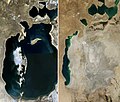Haloxylon is a genus of shrubs or small trees, belonging to the plant family Amaranthaceae. Haloxylon and its species are known by the common name saxaul...
6 KB (623 words) - 21:47, 30 July 2024
Haloxylon ammodendron, variously called the saxaul (Russian: саксау́л, romanized: saksaúl), black saxaul, also spelled sacsaoul or saksaul is a plant...
10 KB (1,055 words) - 05:18, 3 October 2024
Haloxylon persicum, the white saxaul, is a small tree belonging to the family Amaranthaceae. Its range is Western Asia, including the Palestine region...
3 KB (293 words) - 01:32, 6 May 2024
Haloxylon salicornicum is a shrub or undershrub belonging to the family Amaranthaceae. It is a desert shrub and is found in Israel, Palestine, Jordan...
3 KB (187 words) - 13:14, 13 November 2024
Haloxylon scoparium (syns. Arthrophytum scoparium and Hammada scoparia) is a species of flowering plant in the family Amaranthaceae, native to semiarid...
2 KB (97 words) - 07:30, 30 January 2023
Soda stocksii (redirect from Haloxylon recurvum)
Phylogenetic analysis in 2007 revealed that the species did not belong to genus Haloxylon and had to be classified in the genus Salsola, however, the correct name...
5 KB (539 words) - 15:38, 5 March 2024
water in a parasitic fashion from the black saxaul (Haloxylon ammodendron) and white saxaul (Haloxylon persicum).[citation needed] Cistanche deserticola...
4 KB (386 words) - 21:58, 10 April 2024
Bunge, Micropeplis Bunge) Halothamnus Jaub. & Spach, with 21 species Haloxylon Bunge Hammada Iljin, with 12 species Horaninovia Fisch. & C. A. Mey, with...
8 KB (731 words) - 07:58, 12 April 2024
Region northwest China where they grow on desert host plants tamarix and Haloxylon ammodendron. Along with other members of the genus, Cistanche deserticola...
7 KB (431 words) - 05:05, 3 April 2024
(Cenchrus ciliaris). Shrubs consisted mainly in Rhantheruim suaveolens, Haloxylon scoparium and H. schmittianum. This species is oviparous. Females lay...
2 KB (222 words) - 17:45, 12 November 2024
enchanting, giving and enlightening. It may also refer to a small tree: Haloxylon persicum. Notable people with the name include: Ghada Abdel Aal (born...
2 KB (279 words) - 23:07, 6 November 2024
do not have leaves at all. These include the C4 perennial woody plant, Haloxylon ammodendron which is a native of northwest China. Non-succulent perennials...
39 KB (4,561 words) - 16:46, 30 October 2024
dozen kinds of grasses and herbs, the most conspicuous being saxaul (Haloxylon ammondendron) and Agriophyllum gobicum. The others include prickly convolvulus...
38 KB (4,871 words) - 08:45, 6 November 2024
Black saxaul (Haloxylon ammodendron, Amaranthaceae) provided fuel for caravans following the Silk Road in Central Asia....
28 KB (2,384 words) - 18:54, 26 June 2024
Orenburg Vasily Perovsky ordered an "as large as possible supply" of saxaul (Haloxylon ammodendron, a desert shrub akin to the creosote bush) to be collected...
85 KB (9,547 words) - 13:40, 14 November 2024
They can also be found on plants growing in drier habitats, for example Haloxylon ammodendron, the saxaul. Eckehart J. Jäger: Rothmaler Exkursionsflora...
1 KB (139 words) - 09:37, 10 January 2024
three dominant desert species: Salsola inermis, Artemisia sieberi and Haloxylon scoparium. Another effect of dew is its hydration of fungal substrates...
13 KB (1,619 words) - 22:51, 15 October 2024
of Parapedobacter which has been isolated from the stem of the plant Haloxylon ammodendron. "Parapedobacter". LPSN. "Parapedobacter deserti". www.uniprot...
2 KB (148 words) - 12:42, 2 November 2024
Mongolia and China (Xinjiang). The larvae feed on Haloxylon persicum, Haloxylon ammodendron, Haloxylon subaphyllus, Climacoptera crassa and Gamanthus gamocarpus...
2 KB (120 words) - 00:45, 8 December 2023
examples of psammophyte species include: Agriophyllum squarrosum (sand rice) Haloxylon ammodendron (saxaul) Linaria arenaria (sand toadflax) Omphalodes kuzinskyanae...
15 KB (1,341 words) - 17:36, 22 October 2024
Halanthium, Halarchon, Halimocnemis, Halocharis, Halogeton, Halothamnus, Haloxylon, Hammada, Horaninovia, Iljinia, Kaviria, Lagenantha, Nanophyton, Noaea...
23 KB (1,837 words) - 05:18, 26 July 2024
synonym of Haloxylon Bunge. Note; Hammada scoparia (Pomel) Iljin a former species in the genus, is classed as an accepted synonym of Haloxylon scoparium...
4 KB (427 words) - 07:03, 14 November 2023
protected area in 1995. The reserve is characterized by floras of and Haloxylon salicornicum and Calligonum. It is also a habitat to the Houbara bustard...
1 KB (148 words) - 04:29, 27 September 2023
ecoregion. Sandy areas typically feature White saxaul (Haloxylon persicum) and Black saxaul (Haloxylon ammodendron), which are short hardy trees that are...
5 KB (549 words) - 17:58, 12 May 2024
and 24 families. Most common of them are below; Prosopis cineraria [1] Haloxylon salicornicum Cholistan Desert Rangelands | Forest, Wildlife & Fishries...
23 KB (2,517 words) - 10:49, 9 November 2024
Coleophoridae. It is found in Turkestan and Uzbekistan. The larvae feed on Haloxylon persicum. Larvae can be found from September to October. Wikimedia Commons...
1,011 bytes (74 words) - 16:35, 10 January 2024
the ground. One nest near the Ili River was noted to be a small tree, Haloxylon, while another was a perhaps dangerously hot sandy dune. One successful...
171 KB (24,159 words) - 21:23, 9 November 2024
Coleophoridae. It is found in Turkestan and Mongolia. The larvae feed on Haloxylon aphyllum. Larvae can be found from September to October. Coleophora captiosa...
1 KB (82 words) - 11:56, 15 March 2024
Israel it is a common dominant plant along with Anabasis syriaca and Haloxylon scoparium in a low semi-shrubby steppe ecosystem which during dry years...
73 KB (7,145 words) - 17:21, 31 October 2024
of low scrub of Anabasis brevifolia. Taller shrublands of saxaul bush (Haloxylon ammodendron) and Ephedra przewalskii can be found near the margins of...
54 KB (5,459 words) - 16:22, 5 November 2024






















